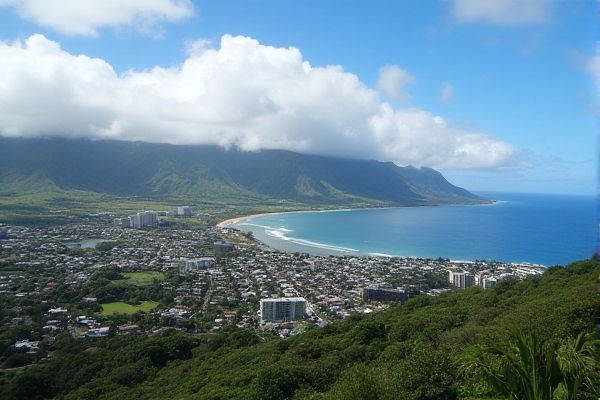
Why moving to Hawaii: Unique Island Culture. High Cost of Living. Tropical Climate All Year. Scenic Natural Beauty. Laid-back Lifestyle. Limited Job Market. Diverse Wildlife. Tight-knit Community. Isolation from Mainland. Rich Hawaiian Traditions.
Unique Island Culture
Moving to Hawaii offers the chance to immerse yourself in a unique island culture that is a rich blend of Polynesian, Asian, and Western influences, characterized by vibrant traditions such as Hula dancing, Ukulele music, and a deep reverence for nature and ancestral heritage. To learn more about this fascinating culture, you can visit Hawaii.com, which provides comprehensive insights into the historical and cultural aspects of the islands, enhancing your understanding and appreciation of this beautiful paradise.
High Cost of Living
Moving to Hawaii is challenging due to its exceptionally high cost of living, with a cost of living index of 193.3, nearly twice the national average. This steep expense is driven by factors such as expensive housing, groceries, and other necessities. Despite the state's high median income and low poverty rate, the financial strain remains significant. For more detailed insights, you can explore the Cost Of Living Index By State from World Population Review which provides a comprehensive overview of economic conditions across the United States.
Tropical Climate All Year
Hawaii, known for its tropical climate, is a paradise offering near-constant trade winds that help to maintain comfortable temperatures throughout the year. Daytime temperatures hover in the upper 80s°F (around 31°C) while evenings are pleasantly cool, dipping into the mid 70s°F (approximately 24°C). The year is divided into two distinct seasons; a dry season from May to October and a wet season from October to April. For more detailed information about the unique climate and environmental factors, you can visit the Pacific RISA website.
Scenic Natural Beauty
Moving to Hawaii offers the opportunity to immerse yourself in breathtaking natural beauty, including the Napali Coast's emerald-green pinnacles and hidden beaches, Waimea Canyon's panoramic views, and the iconic Le`ahi (Diamond Head), among many other stunning landscapes and unique geological formations. Explore these Natural Wonders to witness the unparalleled beauty and diverse ecology that Hawaii has to offer, creating an unforgettable experience for all who visit or choose to call it home.
Laid-back Lifestyle
Living in Hawaii offers a unique lifestyle where the focus is not predominantly on work but rather on enjoying outdoor activities and embracing a relaxed atmosphere. The slower pace of life in Hawaii is all about valuing leisure and community, far removed from high-pressure work environments that are common elsewhere. This laid-back lifestyle is further exemplified by a work environment that is significantly less intense, encouraging people to prioritize what they do outside of work. The cultural attitude in Hawaii emphasizes enjoying life to its fullest and maintaining a relaxed, nature-focused way of living. For more insights into this unique way of life, explore how [Living Hawaiian Style](https://www.livinginhawaii.com/hawaii/life-in-hawaii-living-hawaiian-style/) captures the essence of this beautiful island lifestyle.
Limited Job Market
Moving to Hawaii can be challenging due to its limited job market, as evidenced by the significant increase in unemployment and underutilization rates during the pandemic. Hawaii experienced one of the highest state unemployment rates, with a large portion of its labor force facing long-term unemployment and underemployment. This situation underscores the difficulty potential residents might face when seeking employment in this region. For more detailed insights, the website UHERO provides comprehensive analysis. Understanding these dynamics is essential for anyone considering relocation to the Hawaiian islands during such uncertain economic times.
Diverse Wildlife
Moving to Hawaii offers the opportunity to experience a uniquely diverse wildlife, with over 21,000 recorded species. This includes endemic animals like the Hawaiian Monk Seal, Hawaiian Hoary Bat, and the Nene Goose, as well as a rich marine life featuring manta rays, dolphins, and whales. To explore more about this captivating biodiversity, visit the Hawaii Animals website, where you can uncover the vast array of species that call the islands home.
Tight-knit Community
Moving to Hawaii offers the benefit of tight-knit communities, where neighborhoods are highly connected, with residents often knowing each other through activities like walking dogs and participating in school sports, fostering a strong sense of community and social connection. Hawaii's tight-knit communities are characterized by active family involvement and a strong sense of 'Ohana, extending beyond immediate family to include friends and the broader community, which is crucial for social well-being and longevity. For more insights into the vibrant community life in Honolulu, explore the Things We Like About Honolulu article, which highlights the unique lifestyle benefits of living on the islands.
Isolation from Mainland
Moving to Hawaii involves significant isolation from the mainland, with the islands being over 2,471 miles from California and over 4,000 miles from Japan, which can lead to feelings of being trapped and reliance on shipping for essential supplies. However, this isolation also offers unique cultural and environmental experiences. For more insights on island life, the Hawaii Life Blog offers valuable perspectives on embracing and overcoming the challenges of living in Hawaii.
Rich Hawaiian Traditions
Moving to Hawaii offers the opportunity to immerse oneself in rich Hawaiian traditions, such as the honi ihu (nose-to-nose greeting), the symbolic use of leis, and the profound value of Malama `Aina (taking care of the land), which are deeply rooted in Native Hawaiian culture and continue to influence the local way of life. To learn more about these fascinating traditions, visit the Go Hawaii website, where you can explore the cultural practices that define and enrich the islands.
